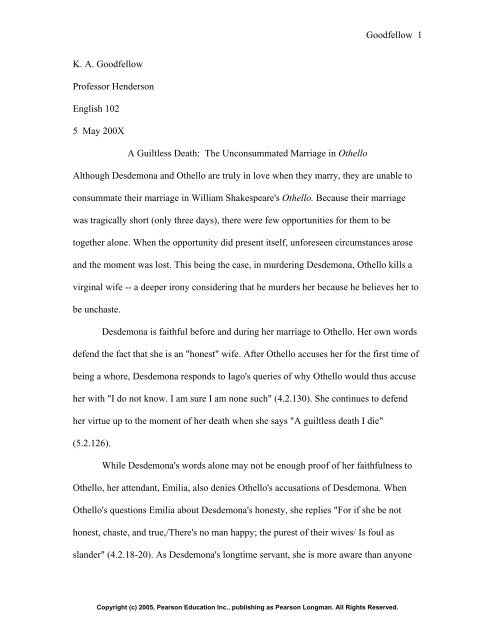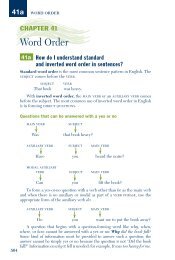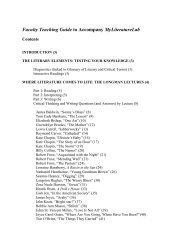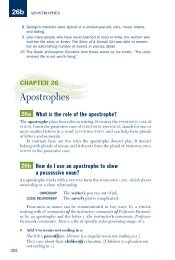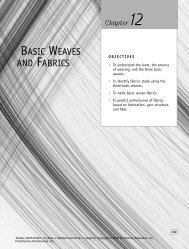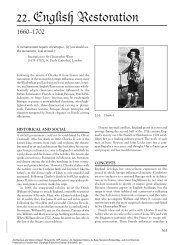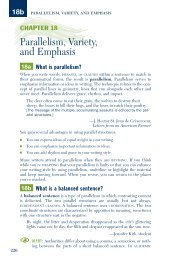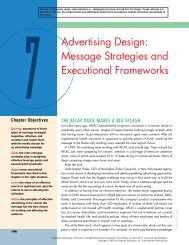A Guiltless Death: The unconsummated Marriage in “Othello” by K
A Guiltless Death: The unconsummated Marriage in “Othello” by K
A Guiltless Death: The unconsummated Marriage in “Othello” by K
You also want an ePaper? Increase the reach of your titles
YUMPU automatically turns print PDFs into web optimized ePapers that Google loves.
K. A. Goodfellow<br />
Professor Henderson<br />
English 102<br />
5 May 200X<br />
A <strong>Guiltless</strong> <strong>Death</strong>: <strong>The</strong> Unconsummated <strong>Marriage</strong> <strong>in</strong> Othello<br />
Goodfellow 1<br />
Although Desdemona and Othello are truly <strong>in</strong> love when they marry, they are unable to<br />
consummate their marriage <strong>in</strong> William Shakespeare's Othello. Because their marriage<br />
was tragically short (only three days), there were few opportunities for them to be<br />
together alone. When the opportunity did present itself, unforeseen circumstances arose<br />
and the moment was lost. This be<strong>in</strong>g the case, <strong>in</strong> murder<strong>in</strong>g Desdemona, Othello kills a<br />
virg<strong>in</strong>al wife -- a deeper irony consider<strong>in</strong>g that he murders her because he believes her to<br />
be unchaste.<br />
Desdemona is faithful before and dur<strong>in</strong>g her marriage to Othello. Her own words<br />
defend the fact that she is an "honest" wife. After Othello accuses her for the first time of<br />
be<strong>in</strong>g a whore, Desdemona responds to Iago's queries of why Othello would thus accuse<br />
her with "I do not know. I am sure I am none such" (4.2.130). She cont<strong>in</strong>ues to defend<br />
her virtue up to the moment of her death when she says "A guiltless death I die"<br />
(5.2.126).<br />
While Desdemona's words alone may not be enough proof of her faithfulness to<br />
Othello, her attendant, Emilia, also denies Othello's accusations of Desdemona. When<br />
Othello's questions Emilia about Desdemona's honesty, she replies "For if she be not<br />
honest, chaste, and true,/<strong>The</strong>re's no man happy; the purest of their wives/ Is foul as<br />
slander" (4.2.18-20). As Desdemona's longtime servant, she is more aware than anyone<br />
Copyright (c) 2005, Pearson Education Inc., publish<strong>in</strong>g as Pearson Longman. All Rights Reserved.
Goodfellow 2<br />
else of her mistress' actions and whereabouts. If she knows Desdemona to be chaste, then<br />
she <strong>in</strong>deed is. She defends Desdemona <strong>in</strong> private moments, and even proclaims to<br />
Othello his wife's <strong>in</strong>nocence as she herself dies, "Moor, she was chaste. She loved thee,<br />
cruel Moor" (5.2.258).<br />
In order to say Desdemona died a virg<strong>in</strong>, we must prove that she and Othello were<br />
unable to consummate their marriage. For the purposes of argument, we will assume that<br />
Desdemona enters the marriage a virg<strong>in</strong>.<br />
<strong>The</strong> first opportunity that Desdemona and Othello have to consummate their<br />
marriage is their wedd<strong>in</strong>g night. Cassio and certa<strong>in</strong> officers of the Venetian court ru<strong>in</strong> this<br />
chance when they come to Othello's lodg<strong>in</strong>gs to <strong>in</strong>form him that the Duke requires his<br />
presence <strong>in</strong> council immediately. While they may have had time to consummate their<br />
marriage before Cassio arrived, Othello's own words to the Duke and Senators are proof<br />
that noth<strong>in</strong>g has happened yet, "It is most true; true, I have married her./<strong>The</strong> very head<br />
and front of my offend<strong>in</strong>g/ Hath this extent, no more" (1.3.81-83). He <strong>in</strong>forms the court<br />
that he has done noth<strong>in</strong>g more than marry Desdemona up to this po<strong>in</strong>t.<br />
After learn<strong>in</strong>g he has to leave for Cyprus that even<strong>in</strong>g, he asks the court to let his<br />
new wife jo<strong>in</strong> him. To assure them that she will not distract him from his duties, Othello<br />
says, "Vouch with me, heaven, I therefor beg it not/To please the palate of my<br />
appetite,/Nor to comply with heat-the young affects/In me defunct-and proper<br />
satisfaction,/But to be free and bounteous to her m<strong>in</strong>d" (1.3.262-266). In say<strong>in</strong>g this, he<br />
means his marriage is not one of passion but of companionship. <strong>The</strong>refore,<br />
consummat<strong>in</strong>g their marriage is not of the utmost importance to Othello and unlike the<br />
"appetites" of younger men, sex will not be a major objective while he is <strong>in</strong> Cyprus.<br />
Copyright (c) 2005, Pearson Education Inc., publish<strong>in</strong>g as Pearson Longman. All Rights Reserved.
Desdemona and Othello have but a brief time together before he leaves for<br />
Goodfellow 3<br />
Cyprus. While they technically could use this time to consummate their marriage, it is<br />
highly unlikely that they take advantage of this opportunity. <strong>The</strong> amount of time Othello<br />
has to prepare for his trip is short. "Come Desdemona. I have but an hour/ Of love, of<br />
worldly matters and direction,/To spend with thee. We must obey the time" (1.3.299-<br />
301), are Othello's words as they prepare to return home. <strong>The</strong>y must discuss his trip,<br />
pack, organize his "worldly affairs," and say good-<strong>by</strong>e with<strong>in</strong> an hour. With a schedule<br />
such as this, there is not much time left to consummate a marriage. Further proof lies <strong>in</strong><br />
the fact that Othello has admitted to the Court that he is not a man of sexual passions. It is<br />
not logical to th<strong>in</strong>k that he would rush home and quickly make love to his virg<strong>in</strong> bride<br />
when he has to immediately leave to wage war.<br />
<strong>The</strong>ir first night together <strong>in</strong> Cyprus is the next opportunity they have to<br />
consummate their marriage. Before they retire for the even<strong>in</strong>g, we learn that <strong>in</strong> fact<br />
Othello and Desdemona have not yet made love when Othello says to Desdemona,<br />
"Come, my dear love,/<strong>The</strong> purchases made, the fruits are to ensue;/That profit's yet to<br />
come 'tween me and you.-" (2.3.8-10). <strong>The</strong> "purchase" is their marriage contract, but the<br />
"profit" has yet to be paid. However, unforseen circumstances prevent them yet aga<strong>in</strong>. To<br />
prove this, we should reexam<strong>in</strong>e the events that follow their departure to bed.<br />
Immediately after they leave, Iago and Cassio have a conversation that would<br />
occupy no more than three or four m<strong>in</strong>utes of time, barely enough for Othello and<br />
Desdemona to get to their sleep<strong>in</strong>g quarters. After Cassio leaves, Iago sets a plan <strong>in</strong><br />
motion to get Cassio and Montano to fight. This would have taken no more than fifteen<br />
Copyright (c) 2005, Pearson Education Inc., publish<strong>in</strong>g as Pearson Longman. All Rights Reserved.
m<strong>in</strong>utes -- not much time for a lady to get ready for her "first time," especially<br />
Goodfellow 4<br />
consider<strong>in</strong>g the layers of cloth<strong>in</strong>g that women of the Renaissance period wore (many had<br />
their maidservants sew them <strong>in</strong>to their cloth<strong>in</strong>g). Dur<strong>in</strong>g the fight, Iago sends Roderigo to<br />
fetch Othello who returns almost immediately, fully clothed. Consider<strong>in</strong>g that it is<br />
unlikely that Othello would respond to an urgent call <strong>by</strong> tak<strong>in</strong>g the time to redress, the<br />
logical conclusion is that, yet aga<strong>in</strong>, Othello and Desdemona have been thwarted.<br />
<strong>The</strong> fact that Desdemona leaves with her attendants and later returns with them is<br />
further proof that husband and wife have not been alone together. <strong>The</strong> impression is that<br />
her servants had not yet been dismissed for the even<strong>in</strong>g. It is logical to assume that if<br />
Othello and Desdemona had the time to be alone, her attendants would have already left<br />
her side.<br />
While Othello and Desdemona have the opportunity to consummate their<br />
marriage after the fight, logic suggests they do not. Othello, hav<strong>in</strong>g fired Cassio, a man<br />
he loved and trusted, is very upset and distracted. He is also concerned with the well-<br />
be<strong>in</strong>g of Montano who was wounded <strong>in</strong> the fight. His last words <strong>in</strong> Act 2, Scene 3 are to<br />
Montano, "Sir for your hurts,/Myself will be your surgeon" (2.3.227-228). He <strong>in</strong>tends to<br />
take care of Montano himself that even<strong>in</strong>g, leav<strong>in</strong>g little time for Desdemona.<br />
<strong>The</strong> next day, Othello's unfounded jealousy drives him to murder his wife. More<br />
proof of her virg<strong>in</strong>ity is provided before her death. After Othello accuses her of be<strong>in</strong>g a<br />
whore, Desdemona tells Emilia to put her wedd<strong>in</strong>g sheets on the bed, "Prithee,<br />
tonight/Lay on my bed my wedd<strong>in</strong>g sheets, remember;/And call thy husband hither"<br />
(4.2.108-109). <strong>The</strong> wedd<strong>in</strong>g sheets play an important role here. Specifically, the virg<strong>in</strong>al<br />
blood expected from the first sexual encounter would show up on the sheets prov<strong>in</strong>g the<br />
Copyright (c) 2005, Pearson Education Inc., publish<strong>in</strong>g as Pearson Longman. All Rights Reserved.
Goodfellow 5<br />
chastity of the bride. It makes sense that she requested her wedd<strong>in</strong>g sheets to be on the<br />
bed that even<strong>in</strong>g for two reasons. First, they had not consummated their marriage yet so<br />
the sheets would be clean and could be used that even<strong>in</strong>g. Second, upon consummat<strong>in</strong>g<br />
their marriage Othello would see the virg<strong>in</strong>al blood and know that Desdemona was not<br />
the whore he had accused her of be<strong>in</strong>g.<br />
Critics may argue that she wanted the sheets put on her bed to rem<strong>in</strong>d Othello that<br />
when they consummated their marriage she was a virg<strong>in</strong>. This theory does not make<br />
sense. If they had <strong>in</strong>deed already made love and the sheets were sta<strong>in</strong>ed, why not just<br />
rem<strong>in</strong>d him of this fact? Furthermore, why would he question her chastity if he knew her<br />
to be a virg<strong>in</strong> upon their marriage?<br />
Desdemona's request to Emilia <strong>in</strong> the next scene, after Emilia has told her that the<br />
sheets are on the bed, further disputes this argument, "If I do die before thee, prithee<br />
shroud me/In one of these same sheets" (4.3.25-26). Why would Desdemona want to be<br />
buried <strong>in</strong> blood-sta<strong>in</strong>ed sheets? <strong>The</strong> answer is they were not sta<strong>in</strong>ed because the marriage<br />
had not been consumated [consummated]. Othello makes a statement that is symbolic of<br />
their non-sexual relationship while prepar<strong>in</strong>g to kill Desdemona, "Yet I'll not shed her<br />
blood, . . ." (5.2.3). This proclamation has a dual mean<strong>in</strong>g -- a literal and an ironic one.<br />
He will not cause Desdemona to bleed when he kills her that even<strong>in</strong>g is the literal<br />
mean<strong>in</strong>g. <strong>The</strong> irony is that he <strong>in</strong>deed will not "shed her blood" -- because he will not<br />
consummate his marriage, and thus know of her <strong>in</strong>nocence.<br />
Othello learns the truth about Desdemona and Cassio only after she is dead.<br />
Desdemona's purity upon her death is made clear <strong>by</strong> Emilia, before her own death, when<br />
she says "For thou hast killed the sweetest <strong>in</strong>nocent/That e'er did lift up eye" (5.2.206-7).<br />
Copyright (c) 2005, Pearson Education Inc., publish<strong>in</strong>g as Pearson Longman. All Rights Reserved.
Goodfellow 6<br />
Although it may not have been their <strong>in</strong>tention, even <strong>in</strong> marriage, Desdemona rema<strong>in</strong>ed<br />
<strong>in</strong>nocent and chaste. Thus, it is a double irony that Othello erroneously murders his wife<br />
for sleep<strong>in</strong>g with another man, but that he murders a wife who has not even slept with<br />
him.<br />
Copyright (c) 2005, Pearson Education Inc., publish<strong>in</strong>g as Pearson Longman. All Rights Reserved.
Work Cited<br />
Goodfellow 7<br />
Shakespeare, William. Othello, the Moor of Venice. Literature and Ourselves. Ed.<br />
Gloria Henderson et al. 5 th ed. New York: Longman Publishers, 2004.<br />
Copyright (c) 2005, Pearson Education Inc., publish<strong>in</strong>g as Pearson Longman. All Rights Reserved.


